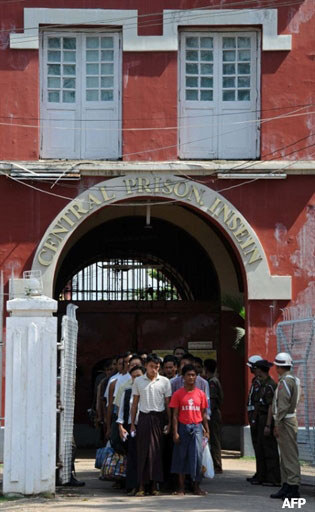Chiang Mai (Mizzima) – A detailed report released on Tuesday by the New York-based Human Rights Watch accused the Burmese military of committing war crimes by forcibly conscripting convict porters during recent fighting in eastern Burma.
 The 70-page report prepared with the assistance of the Thailand-based Karen Human Rights Group (KHRG) comprised 58 interviews with escaped convicts who were used as porters in military operations in Karen State and Pegu Region over the last 18 months.
The 70-page report prepared with the assistance of the Thailand-based Karen Human Rights Group (KHRG) comprised 58 interviews with escaped convicts who were used as porters in military operations in Karen State and Pegu Region over the last 18 months.
In the report titled “Dead Men Walking” escaped prisoners recounted horrific battle conditions in which they were forced to march without food or water for days on end while being beaten by Burmese soldiers. All the porters interviewed said they did not volunteer to go to the front lines and many spoke of how their fellow prisoners who couldn’t keep up were left to die or were summarily executed.
Human Rights Watch’s deputy Asia director Elaine Pearson was quoted in a release that accompanied the report describing convict porters as the “Burmese army's disposable human pack-mules, lugging supplies through heavily mined battlefields. Press-ganging prisoners into deadly frontline service raises the Burmese army's cruelty to new levels.”
One escaped porter, a laborer from the Mandalay region, recounted in a February 2011 interview how his one-year jail term for fighting with a neighbour turned into a near death sentence when last December he was transferred from Meiktila Prison to the battlefront in Karen State to carry explosive shells through a mine field.
According to the porter: “At 10 different times I saw porters step on landmines. Some died, others lost their legs or eyes. If the soldiers got injured, we carried them back but the injured porters just stayed there.”
In an interview conducted in January, one escaped porter recounted how a fellow porter was assured by Burmese soldiers that he would be allowed to return home only to be shot in the back. After the young porter was killed a soldier told the rest of the porters, “You guys see what happens? If you can't climb up, we will kill you.”
Poe Shan a senior researcher with the Karen Human Rights Group who conducted many of the interviews cited in the report told Mizzima that the wide scale and systematic use of convict porters in war zones is an issue that must be investigated by the UN and its related international legal bodies.
According to Poe Shan “our research shows that convict porters have experienced horrible human rights violations at the hands of Burma’s armed forces. There needs to be a UN Commission of Inquiry to fully investigate these and other war crimes that have been committed in Burma.”
According to the report, the offences that convict prisoners were jailed for ran the entire criminal spectrum from relatively minor offences like fighting and illegal lottery sales to the most serious crimes including murder.
While the world’s attention is often focused on the more than 2,000 political prisoners languishing in Burma’s jails, Burma opposition activists like former political prison Thiha Yazar note that Burma’s general prison population consists of numerous falsely imprisoned individuals. Thiha, who spent nearly 18 years in jail for his political activities, told Mizzima, “The Burmese courts are very corrupt so really there is no justice system at all. Regular people who may have only committed minor infractions or are completely innocent are given long jail terms simply because their family members are too poor to bribe their way out.”
Poe Shan told Mizzima that his organization has documented the Burmese army’s use of convict porters in Eastern Burma since 1992. His organizations research has shown that the number of convict porters greatly increases when the Burmese armed forces launch a major offensive as has been the case in areas along the Thai Burma border following the defection of large numbers of members of the Democratic Karen Buddhist Army from the central government’s border guard force.
Poe Shan said that the Burmese armed forces have continued to rely on the practice of forced pottering because local villagers who live in the vicinity of the frontlines frequently hide to avoid being conscripted themselves.
While Human Rights Watch’s Asia division has been highlighting human rights abuses in conflict zones in Burma, the organization, which receives considerable financial support from billionaire George Soros, has continued to condemn the American government for its conduct of the “war on terror.”
One day before the release of the convict porter report, HRW released a report demanding that former President George Bush, his Secretary of Defense Donald Rumsfeld, Vice President Dick Cheney and other senior members of the Bush administration be tried for war crimes for abuses that allegedly include torturing Afghan and Iraqi prisoners at US run detention centers in those occupied countries. The report also accuses the US government of torturing other middle men labeled “enemy combatants” held at the American military base in Guantanamo Bay.
According to the Human Rights Watch report on alleged American war crimes there is “enough strong evidence from the information made public over the past five years to not only suggest these officials authorized and oversaw widespread and serious violations of US and international law, but that they failed to act to stop mistreatment, or punish those responsible after they became aware of serious abuses," it said.
The report on alleged American war crimes also heavily criticized President Obama and his Attorney General Eric Holder for 'failing to act on evidence,’ about the conduct of the Bush administration. HRW urged other governments to prosecute Bush and his colleagues if the Obama administration continues to refuse to do so.


